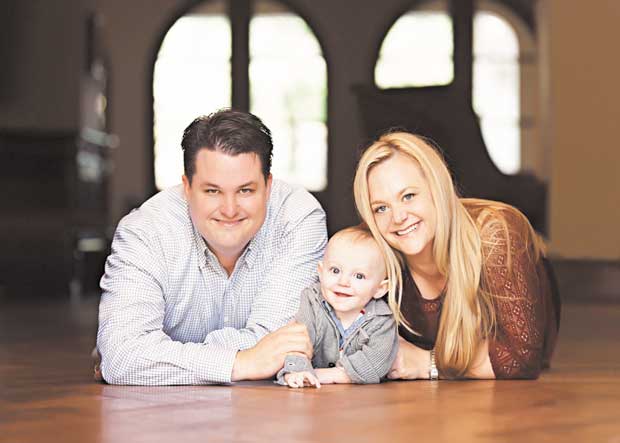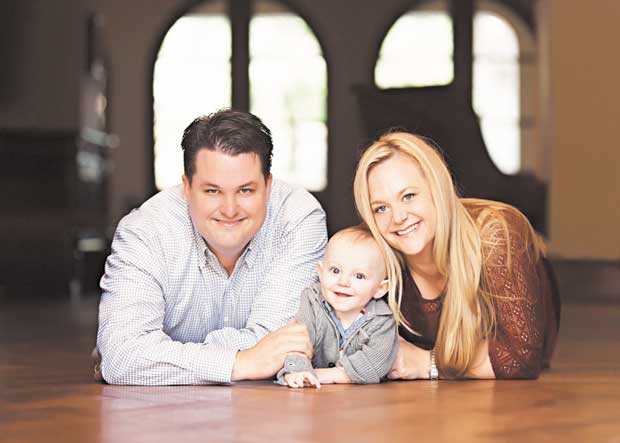New clinic offers personalized approach to parenthood through IVF, with a special outreach to the LGBTQ community

T.J. Farnsworth and his wife, Margaret, above, conceived their son, Wyatt, now 2½, through IVF. Their friend, Chantell Preston, also conceived her daughter, Adyson, now 5½, through IVF. Their experiences on their fertility journey prompted Farnsworth to start a new kind of IVF clinic, and prompted Preston to join his board.
Tammye Nash | Managing Editor
T.J. Farnsworth had just started a company offering community-based cancer services “literally from my kitchen table” when he met “the most wonderful woman you can imagine,” he said. “But because I was a broke entrepreneur, it took me awhile to feel financially stable enough to get married.”
By the time his company was stable and he and Margaret did get married, he said, “we wanted to start a family immediately, just like in the storybook tales. But it didn’t work that way for us.”
His wife got pregnant, but then had a miscarriage and wasn’t able to get pregnant again. So they turned to fertility specialists for help. They tried artificial insemination — now called IUI, or intrauterine insemination — and finally turned to in vitro fertilization. But the difficulties continued.
“We got pregnant, then had another miscarriage,” Farnsworth said. “So we tried IVF again. But we had learned more by then, so we had a genetic screening done first. Now, we have a two-year-old son” conceived through the IVF process.
And while they were ultimately successful in getting the child they wanted, Farnsworth said both he and his wife felt the whole process had been an unnecessarily traumatic ordeal.
“It was a very frustrating process for us,” he recalled. “As a person in the health care field myself, it was very confusing — why do this certain thing this certain way? It all — not the actual IVF, but the process overall — it all felt very cold.
“I remember so many times my wife would be in tears,” Farnsworth continued. “She told me she often felt like we were just part of some big cattle call. We were treated like a number, not like people. To me, I remember feeling like we were dealing with used car salesmen — there was always some new surprise cost that kept popping up that we had to pay.”
Farnsworth said he thought at first that it was just the clinic they were using that was the problem, that it was unusual for being disorganized and poorly operated. But as he traveled around the country he visited other IVF clinics and “I realized that they were all operated that way. It was just systemic in the industry.”
Farnsworth said and his wife talked often with friends who had also gone through IVF to have children, and “they all had the same commentary.” And when they talked to gay and lesbian couples “who obviously had to go through some kind of fertility treatment to start their families, I realized that they had even more struggles. Some clinics wouldn’t even help [same-sex couples] at all. They’d tell them they needed to go somewhere else. Hearing that, it makes you feel like a second-class citizen,” he said.
Farnsworth said, “The more I thought about it, the more I talked to people, I just knew that this wasn’t the way it was supposed to be done. I thought about it and about the fact that I work in health care, and I just felt like it could be fixed. It could be done differently, done better.”
So in the middle of 2014, Farnsworth announced he would be leaving his cancer services company at the end of that year to start a new company to create new, better IVF clinics. After spending 2015 “designing and managing how patients should experience fertility,” he opened his first Aspire Fertility Clinic in Houston this past January.
Now, seven months later, the second Aspire Fertility Clinic is set to open in Addison.
Farnsworth said there are a number of aspects of doing business that set Aspire apart from other such clinics, starting with training staff to “get to know our clients, to remember them each time they come back.” Aspire also has a licensed marriage and family therapist on staff full time and on duty and on site at all times. And that’s a service that’s “totally free to our patients.”
“Going through IVF is a very emotional journey,” he said. “My wife and I underestimated the stress it would put on our relationship and that caused some problems for us.”
Aspire also offers its patients the services of a financial counselor trained to help them plan that side of their fertility journey, working with insurance companies, setting up payment plans and even helping couples find grants that could help cover the cost. “And,” Farnsworth added, “we provide all the services for one price, and it is 100 percent inclusive. It even includes parking. They don’t pay for anything else, ever.”
While most clinics keep the science side of things closed off and unavailable, Farnsworth said Aspire is just the opposite. “There’s no magic behind what we do, just science. And the embryology lab is where the science happens. One of the walls in our embryology lab is floor-to-ceiling glass, so the couples can walk up and see what happens inside. They can meet the scientists, ask them questions. After all, those scientists are really our patients’ first baby sitters.”
The way that same-sex couples are treated is yet another way in which Aspire stands apart from other such clinics, Farnsworth said. Aspire board member Chantell Preston agreed.
Preston is a lesbian who got pregnant through IVF and gave birth to her daughter Adyson five-and-a-half years ago. Like Farnsworth and his wife, Preston said she found the process to be cold and impersonal.
So when Farnsworth approached her about being part of Aspire, Preston said she was glad to tell her friend yes.
“We thought we could do it better,” Preston said. “We knew we could reach out to everyone and provide a personalized service. This isn’t just a physical process. It’s a very emotional process, too. And being part of the LGBTQ community myself, I knew that a lot of my friends were looking for somewhere that would understand their lives and their needs. We knew we had a chance to reach out to the community in a very special way. We knew we could do this better and help as many people as possible.”
Farnsworth agreed. “There are a lot of LGBTQ couples that need to feel welcome, to feel that they are accepted and understood within our facility, and we are doing everything we can to accommodate that. We train our staff to accommodate that. We even have some transgender couples we’re treating in Houston, and to our knowledge, there are no other IVF clinics that do that.
Every patient that comes to Aspire is “part of our family. We’re all going through this journey together,” Farnsworth said. And that is especially true of the clinic’s LGBTQ patients.
“From our perspective, and what it is important for the LGBTQ community to understand, we know that every single child they have is intentional. They have to work extra hard. It should be as joyous an experience for them — for all our patients — as possible,” Farnsworth said.
When same-sex couples are turned away from or treated poorly at a clinic, “that’s not fair,” he continued. “It’s not appropriate, and it’s something we want to change. We have a social responsibility to affect that change. Because of what we are doing, other clinics are being forced to be more open with the types of patients they treat, and that’s a win for all of us.”
For information visit AspireFertility.com.
…………………..
The surrogacy option
There are many roads to parenthood, and Lotus Blossom Consulting helps its clients explore the option of surrogacy. The international company based in Dallas also has a special program on “LGBT Family Building” to help same-sex couples navigate through the surrogacy process.
For information visit LotusBlossomConsulting.com or call 847-989-8628.
This article appeared in the Dallas Voice print edition July 29, 2016.
















